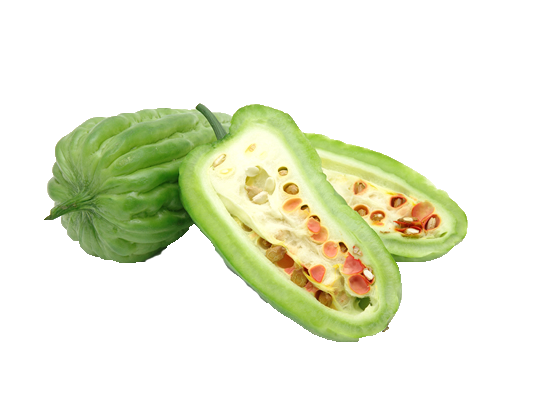|
Very low in
calories provides only 17 Cal per 100g. The pods are rich in phytonutrients
like dietary fibre, minerals, vitamins and anti-oxidants.
Bitter melon
notably contains phyto-nutrient, polypeptide-P; a plant insulin known to lower
blood sugar levels. In addition it also contain hypoglycaemic agent called
charantin. Charantin increases glucose uptake and glycogen synthesis in the
cells of liver, muscle and adipose tissue. Together, these compounds are
thought to be responsible for reduction of blood sugar levels in the treatment
of type-2 diabetes.
Fresh pods are an
excellent source of folates; contains about 72 mcg/100g (Provides 18% of RDA).
Folate helps reduce incidence of neural tube defects in pregnant mothers
when taken during early pregnancy.
Fresh bitter
melon is an excellent source of vitamin-C (100g of raw pod provides about 140%
of RDI). Vitamin-C, one of the powerful natural antioxidant, helps body scavenge
deleterious free radicals one of the reasons for cancers development.
It is an
excellent source of health benefiting flavonoids such as beta-carotene,
alpha-carotene, lutein, and zeaxanthins. It also contains good amount of
vitamin A. Together, these compounds help act as protective scavengers against
oxygen-derived free radicals and reactive oxygen species (ROS) that play a role
in aging, cancers and various disease processes.
Bitter melon
stimulates easy digestion and peristalsis of food through the bowel until it is
excreted from the body. Thus, helps in relieving indigestion and constipation
problems.
The vegetable is
also good source of Niacin (vitamin B-3), Pantothenic acid (vit.B-5),
Pyridoxine (vit.B-6) and minerals such as iron, zinc, potassium, manganese and
magnesium.
Early laboratory
tests suggest that compounds in bitter melon might be effective for treating
HIV infection.
Diabetes
Treatment: Bitter melon is one of the most
potent fruits for managing diabetes mellitus for a few reasons. There are
significant levels of charntin, peptides that resemble insulin, and alkaloids
within the fleshy fruit of bitter melon. All of these components actively
affect the levels of blood sugar, namely in reducing it. It also helps to
prevent unpredictable spikes and drops in insulin levels by regulating the
metabolism and use of sugar that the body has consumed in food. As a powerful hypoglycaemic agent, bitter
melon should not be used in conjunction with other medicines that lower blood
sugar, because it can actually cause a dangerous lack of blood sugar in the
body!
Haemorrhoid
Relief: A number of studies have shown that
the anti-inflammatory qualities present in bitter melon make it a very good
salve for the uncomfortable condition of piles, also known as haemorrhoids.
When you create a paste from the root of the bitter melon plant, you can apply
it topically to reduce the inflammation and relieve pain and bleeding. If you
drink bitter melon juice, you can also receive similar benefits, if you can
handle the taste!
Immune
System Health: Bitter melon is a source of
many different antioxidants that make it a powerful defence mechanism against
illness in the body. Antioxidants scavenge the body for free radicals,
dangerous compounds released during cell metabolism that can cause any number
of different illnesses. By adding bitter melon to your diet, you can greatly
improve your chances of defending against very serious diseases, including
heart attack, kidney damage, and liver failure; three of the many places where
free radicals like to cause health issues.
Cancer
Prevention: The antioxidants present in
bitter melon may help to seek out and destroy free radicals that can cause
diseases (including numerous forms of cancer), but that is not the only benefit
the fruit has in terms of cancer. Bitter melon has been widely studied as an
anti-tumour and anti-carcinogenic agent all by itself, along with its natural
boost to antioxidant numbers in the body. Primarily, studies have shown
positive correlations between eating bitter melon and the prevention or reduction
in tumour growth for cervical, prostate, and breast cancer patients. Some of
this is due to the fruit’s ability to induce apoptosis (cell death) in
cancerous cells. However, more studies are being done all the time to find out
more about the powerful anti-cancer properties that this unassuming fruit seems
to possess, and which other types of cancer patients it could benefit.
Respiratory
Conditions: There have been a number of
studies that showed bitter melon as a means of getting relief from respiratory
conditions like asthma, bronchitis, and hay fever (rhinitis). It’s
anti-histamine, suppressant, anti-inflammatory, expectorant, and antiviral
properties make it an ideal booster for respiratory health. It is recommended
to eat some bitter melon before going to bed, so the soothing effects occur
while you’re sleeping!
Fungal
Infections: The antifungal and antibacterial
qualities of bitter melon make it ideal for fighting off various fungal
infections, and also helping to rid the bloodstream of those toxins before they
can do any more damage. Specifically, in terms of infections and skin health,
bitter melon has been useful in treating ringworm and psoriasis. Furthermore,
its anti-inflammatory qualities reduce the irritating itching associated with
such skin conditions and infections. The juice extracted from the leaves can be
the best salve or cure for these conditions, topically applied to the affected
areas.
A Few Words of Caution: The chemicals in bitter melons are powerful health tools,
but should be respected as well. Pregnant women should not consume bitter
melon, because it can stimulate excess menstrual bleeding, and more research
must still be done on consuming bitter melon while breast-feeding, so for now,
it is best to avoid it. Also, as mentioned earlier, it acts very strongly to
reduce blood sugar levels, which can become dangerous, particularly in the time
leading up to and after surgical procedures.
|

